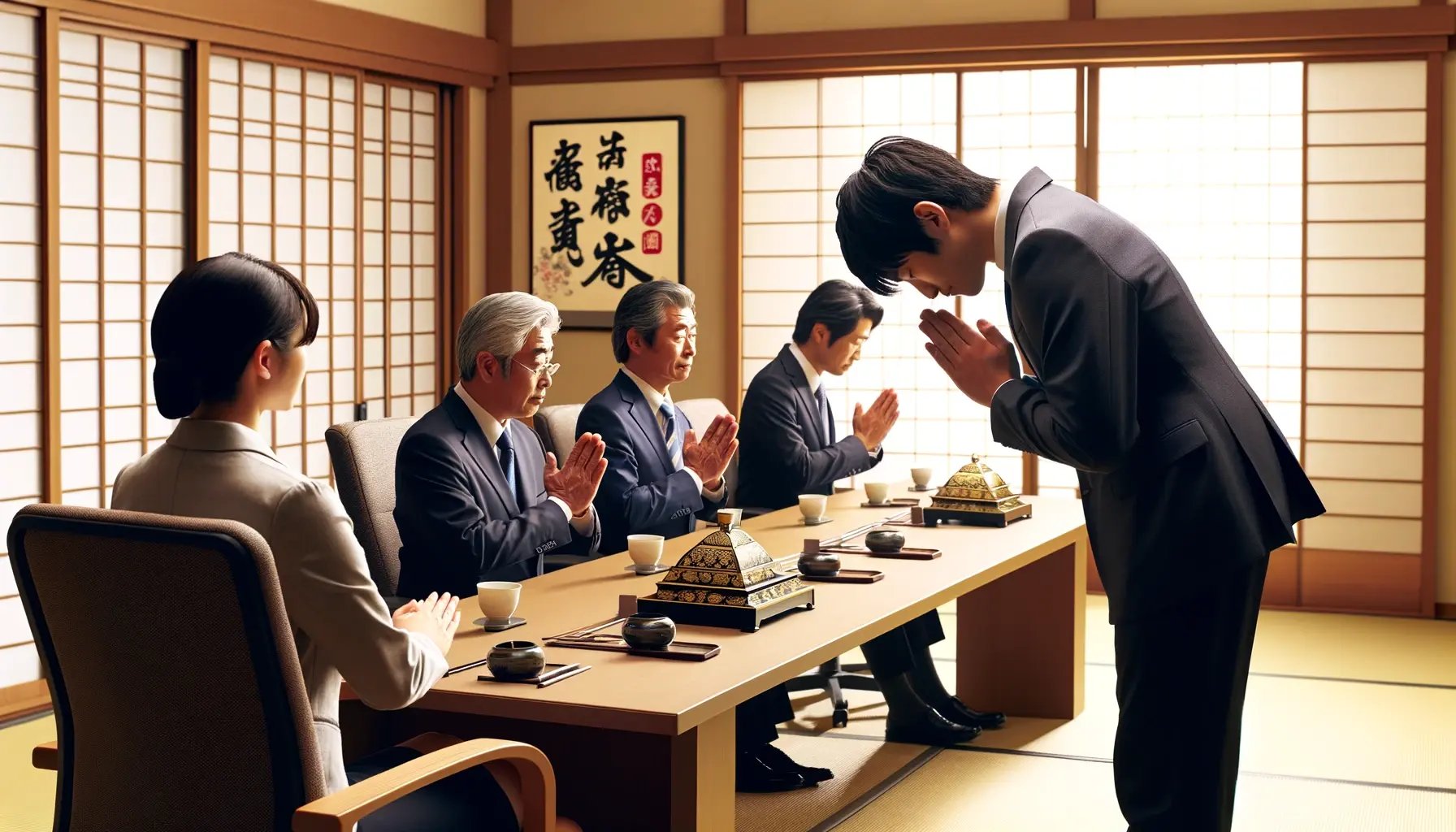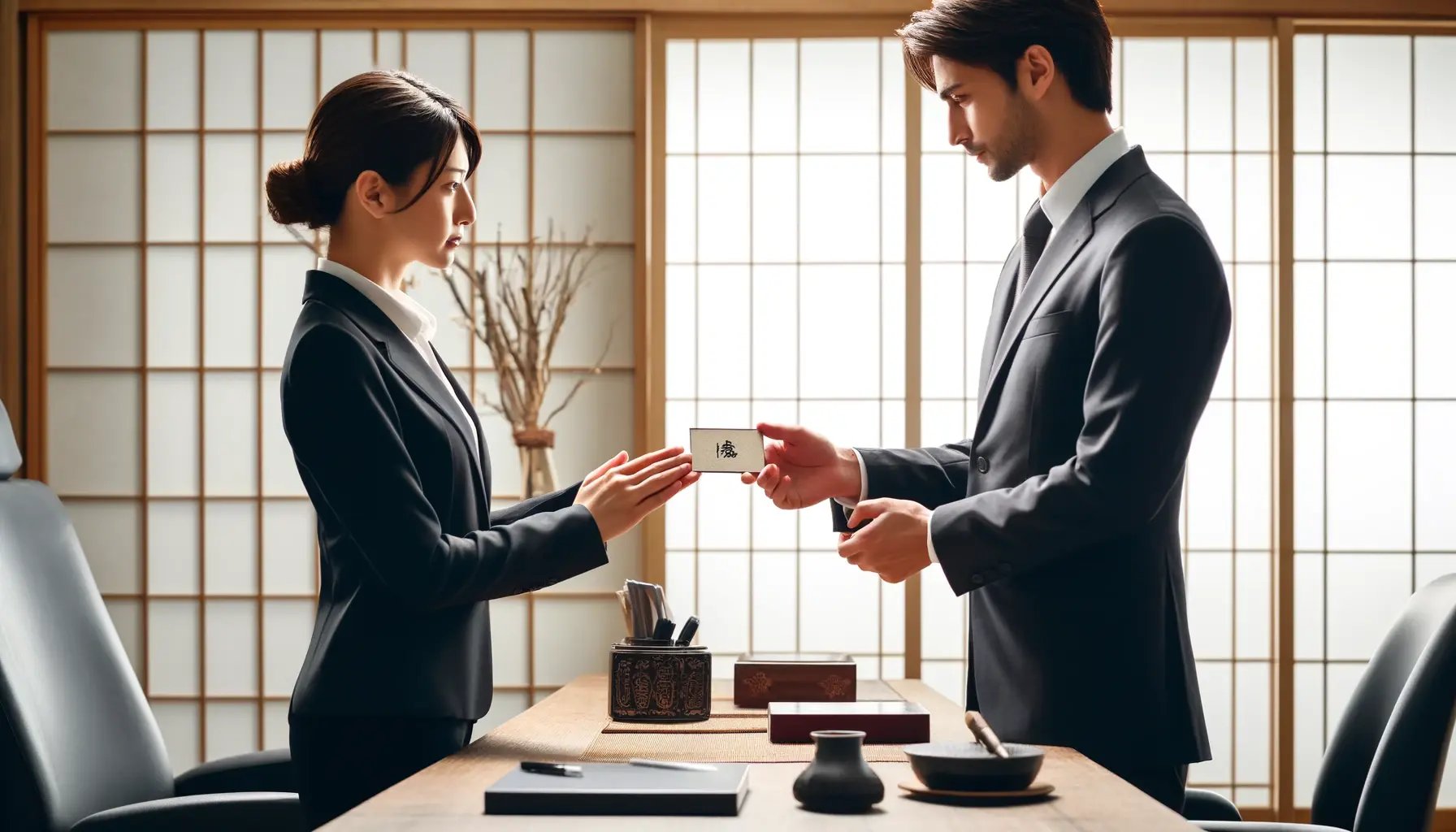Introduction: Grasping the Fundamentals of Japanese Business Culture and Its Impact on Japanese Culture
The Role of Consensus Building and the Exchange of Business Cards (Meishi) in Japanese Business
.%20The%20scene%20includes%20a%20group%20of%20J.webp?width=1792&height=1024&name=DALL%C2%B7E%202024-05-04%2017.11.15%20-%20A%20professional%20business%20meeting%20in%20Japan%20focusing%20on%20consensus%20building%20and%20the%20exchange%20of%20business%20cards%20(meishi).%20The%20scene%20includes%20a%20group%20of%20J.webp)
1. Consensus Building in Business Culture: In Japanese companies, the practice of "nemawashi" is fundamental. This involves informal discussions and achieving agreement among all members before formal meetings, reflecting the deep-rooted values of harmony and conflict avoidance in Japanese business culture.
2. Formal Interactions and Meeting Etiquette: Conducting business in Japan requires understanding specific cultural practices. Japanese employees often use both hands when exchanging business cards, a gesture symbolizing respect and importance in Japanese business dealings. It's also customary to bow, which is held for a brief duration to show deference, rather than shake hands.
3. Meeting Preparation and Execution: Time management is crucial, with adherence to the scheduled time for meetings being a sign of respect. In many Japanese companies, meetings are prepared meticulously, ensuring all involved are briefed far in advance, reflecting the structured nature of business in Japan.
| Country | Formal Greeting Method | Meeting Preparation | Time Punctuality | Business Card Exchange |
|---|---|---|---|---|
| Japan | Bowing, business cards with both hands | Meticulous, scheduled far in advance | Arrival 5-10 minutes early | Both hands, slight bow, card facing recipient |
| USA | Handshake | Agendas circulated beforehand | On time or a few minutes early | Casual, one hand |
| China | Handshake, slight nod | Detailed, agenda-driven | On time | Both hands, nod of acknowledgement |
| Germany | Firm handshake | Precise, goal-oriented | Extremely punctual | One hand, formal |
4. Cultural Nuances in Business Settings: When entering a Japanese office, you may be required to remove your shoes, showcasing the need for an interpreter to navigate such cultural norms effectively. This adherence to tradition is part of doing business in Japan and shows respect for the Japanese side.
5. Respecting Business Formalities: It is advisable to arrive at meetings with a business card holder, as exchanging business cards is a critical part of Japanese corporate life. The business card should be presented and received with two hands, and stored carefully in front of the table for the duration of the meeting.
6. Adapting to Local Customs: Understanding and adapting to local customs such as the appropriate time to greet someone, the proper way to address someone by name followed by a slight bow of the head, and the cultural urge to fill the silence during discussions, are all crucial for future business relations in Japan.
7. Understanding Career and Corporate Dynamics: Many Japanese companies value career progression traditionally, with retirement age and advancement often being part of a structured plan, emphasizing the need for potential business partners from your home country to respect and understand these dynamics for effective collaboration.
Key Elements of Business Etiquette in the Japanese Workplace

1. Understanding the Nuances of Japanese Business Culture: The country's hierarchical social structure heavily influences business culture in Japan. Respect and consideration for seniority are paramount. This can be observed in the meticulous attention given to the seating arrangement during meetings, where the most senior person often sits farthest from the door.
2. Respect: The Cornerstone of Business Interactions: Politeness and punctuality are also highly valued traits in Japanese society, and adhering to these norms is essential when doing business in Japan. Japanese people tend to greet business partners with a handshake and a slight bow of the head.
3. The Art of Gift-Giving: Gift-giving is common in Japanese business contexts. It's important to know that gifts are often presented and received with both hands. The giver may even bow slightly while presenting the gift. Be prepared for the recipient to politely refuse the gift several times before accepting it. This is a customary display of humility.
4. Adapting to a Culture of Hierarchy: Companies are starting to implement more modern approaches, but understanding the traditional emphasis on hierarchy can help you navigate business interactions in Japan. This means being mindful of respecting those in senior positions and allowing them to take the lead in conversations.
How Culture Influences Business Practices in Japan

1. Understanding the Profound Influence of Culture on Japanese Business: When planning a business trip to Japan, it's essential to grasp the unique aspects of Japanese culture. This understanding is crucial for ensuring a successful venture, as it influences all facets of business interactions. The influence of Japanese culture on business is profound and all-encompassing. From the exchange of business cards, or "meishi," which must be done with both hands and a slight bow, to the careful observance of the hierarchical order in every interaction, Japanese business practices are a direct reflection of the broader cultural values. Understanding these subtleties is crucial for Westerners and businesses seeking to establish or maintain successful business relations with Japanese companies.
2. Insights and Strategies for Navigating Business Travel: This comprehensive guide provides valuable insights and strategies for navigating the complexities of business travel in Japan. From logistical preparations to cultural nuances, each aspect is covered to help you prepare thoroughly.
3. Mastering Business Etiquette: Making a Lasting Impression: Mastering the etiquette that is central to Japanese business culture is key to making a lasting impression on your Japanese counterparts. Japanese culture places a high value on respect and hierarchy. This is reflected in business interactions, where greetings, introductions, and communication styles all adhere to specific norms.
4. Respectful Greetings and Body Language: While handshakes are sometimes used, the traditional Japanese greeting involves a slight bow. The deeper the bow, the more respect is conveyed. People are often surprised by the emphasis placed on nonverbal communication in Japan. Maintaining eye contact and avoiding fidgeting are seen as signs of attentiveness and respect.
5. The Japanese believe in a clear social hierarchy. This is evident in business settings, where senior colleagues are typically addressed with titles and deference is shown. Understanding this hierarchy and respecting it will go a long way in building trust and rapport with your Japanese counterparts.
Exploring Key Aspects of Business Etiquette in Japan
Business Cards in Japan: The Art of 'Meishi' Exchange

1. Cultural Insights into Japanese Business Practices: Understanding Japanese culture is fundamental when planning a business trip to Japan. This knowledge is vital for a successful engagement, as it permeates all aspects of business interactions. Awareness of cultural subtleties like the "meishi koukan" or the exchange of business cards can significantly influence the outcome of your dealings. This ritual, performed with the utmost respect—presenting and receiving cards with both hands, positioned 15 degrees towards the recipient for easy reading—symbolizes the initiation of a professional relationship.
2. Comprehensive Guide on Navigating Business in Japan: This guide offers extensive insights and strategies essential for mastering the complexities of business travel in Japan. Covering everything from logistical preparations to understanding critical cultural nuances ensures you are thoroughly prepared. Particularly, the guide highlights the importance of respecting rituals that may seem simple but hold deep significance, such as the precise angle—farthest away at 15 degrees—when exchanging business cards.
3. Mastering Japanese Business Etiquette: Success in Japan's business environment hinges on understanding and adhering to local etiquette. This guide stresses the importance of the "meishi koukan" process, a key ritual in Japanese business culture. The respectful exchange of business cards, performed with both hands and at a slight tilt farthest away, is crucial for making a positive impression and is often considered the first step in building a lasting business relationship.
The Importance of Dress Code and Business Attire in Japanese Business

1. Understanding Japanese Culture: When planning a business trip to Japan, it's important to grasp the unique aspects of Japanese culture. This understanding is crucial for ensuring a successful venture, as it influences all facets of business interactions, including the way individuals are greeted with a handshake or how they bow the head slightly in respect.
2. Insights and Strategies: This comprehensive guide provides valuable insights and strategies for navigating the complexities of business travel in Japan. From logistical preparations to cultural nuances, each aspect is covered to help you prepare thoroughly. It highlights how important it is in Japan to adhere to local customs and business etiquettes.
3. Mastering Business Etiquette: Mastering the etiquette that is central to Japanese business culture is key to making a lasting impression on your Japanese counterparts. This guide emphasizes the importance of respecting and adhering to these cultural norms throughout your business dealings. Dress code in Japanese business settings tends to be conservative; business suits for men and appropriate business attire for women are expected. The traditional preference is for dark-colored suits, white shirts, and modest ties, reflecting the formality and the seriousness with which Japanese people approach business engagements, underscoring the value placed on outward appearances and respect.
Business Meetings in Japan: Procedures and Protocols

1. Grasping Japanese Culture: When planning a business trip to Japan, it's crucial to understand the unique facets of Japanese culture. This knowledge is vital for ensuring a successful venture, influencing all aspects of business interactions. Business meetings in Japan are formal and adhere to strict protocols, underscoring the importance of this cultural comprehension.
2. Insights and Strategies for Business Travel: This comprehensive guide offers valuable insights and strategies for navigating the complexities of business travel in Japan. From logistical preparations to cultural nuances, every element is addressed to help you prepare effectively. Punctuality is essential, and it is advisable to arrive a few minutes early to meetings, reflecting the respect for structure and formality in Japanese business etiquette.
3. Mastering Japanese Business Etiquette: Mastering the etiquette crucial to Japanese business culture is key to making a lasting impression on your Japanese counterparts. This guide stresses the importance of respecting and adhering to these norms throughout your business dealings. Meetings typically begin and end with a bow as a sign of respect, and it's customary to follow the lead of the Japanese counterpart, especially in deciding when to speak or what to discuss. Understanding the importance of business dress in Japan is also vital, as it is an integral part of the formal nature of business interactions there.
Navigating Japanese Business Practices: Culture and Etiquette Insights
Understanding and Adapting to Japanese Greetings and Handshakes

1. Understanding Japanese Culture: When planning a business trip to Japan, it’s essential to grasp the unique aspects of Japanese culture. This understanding is crucial for ensuring a successful venture, as it influences all facets of business interactions.
2. Insights and Strategies: This comprehensive guide provides valuable insights and strategies for navigating the complexities of business travel in Japan. From logistical preparations to cultural nuances, each aspect is covered to help you prepare thoroughly.
3. Mastering Business Etiquette: Mastering the etiquette that is central to Japanese business culture is key to making a lasting impression on your Japanese counterparts. This guide emphasizes the importance of respecting and adhering to these cultural norms throughout your business dealings.
Developing Long-Term Business Relationships in Japan

1. Understanding Japanese Culture: When planning a business trip to Japan, it's crucial to understand the unique aspects of Japanese culture thoroughly. This knowledge is vital for a successful business venture as it significantly influences all facets of business interactions.
2. Insights and Strategies: This comprehensive guide offers valuable insights and strategies to navigate the complexities of business travel in Japan effectively. It covers everything from logistical preparations to understanding cultural nuances, ensuring you are well-prepared for your trip.
3. Mastering Business Etiquette: It is essential to master the etiquette central to Japanese business culture to make a positive, lasting impression on your Japanese counterparts. This guide highlights the importance of respecting and adhering to these cultural norms in all your business dealings.
4. Keyword Content: Building and maintaining relationships are critical in doing business in Japan. Japanese businesspeople often prefer to develop long-term relationships based on mutual trust and respect. The practice of frequent face-to-face meetings and the gradual building of personal connections are typical. Patience and commitment are crucial for successfully navigating this aspect of Japanese business culture.
The Impact of Japanese Cultural Norms on Business Interactions
1. Understanding Japanese Culture: When planning a business trip to Japan, it's essential to understand the distinct aspects of Japanese culture. This knowledge is crucial for ensuring a successful business engagement, as it influences every facet of business interactions.
2. Insights and Strategies: This comprehensive guide offers valuable insights and strategies to navigate the complexities of business travel in Japan. It covers everything from logistical preparations to cultural nuances, ensuring you are well-prepared for your journey.
3. Mastering Business Etiquette: Learning the etiquette central to Japanese business culture is vital for making a positive and lasting impression on your Japanese counterparts. The guide highlights the importance of respecting and adhering to these cultural norms during your business interactions.
4. Keyword Content: Japanese cultural norms significantly affect business conduct. These include avoiding direct refusals, respecting privacy and personal space, and suppressing strong emotional expressions in public. These cultural traits can be perplexing to Westerners, who must adapt to reading between the lines and understanding non-verbal cues for clear and effective communication.
Incorporating Japanese Business Etiquette into Your Company Culture
Training Your Team in Japanese Business Etiquette
1. Understanding Japanese Culture: When planning a business trip to Japan, it’s crucial to understand the unique aspects of Japanese culture. This knowledge significantly impacts all facets of business interactions, making it essential for a successful venture.
2. Insights and Strategies: This comprehensive guide offers valuable insights and strategies to navigate the complexities of business travel in Japan. It covers everything from logistical preparations to cultural nuances, ensuring you are well-prepared for your trip.
3. Mastering Business Etiquette: It's vital to master the etiquette central to Japanese business culture. This guide highlights the importance of respecting and adhering to these cultural norms, which is key to making a lasting impression on your Japanese counterparts.
4. Keyword Content: For companies engaging with Japanese firms, it's crucial to train employees in Japanese business etiquette. This includes understanding the proper exchange of business cards, recognizing the importance of punctuality, and knowing the appropriate use of honorific titles when addressing Japanese counterparts. Such training helps avoid cultural misunderstandings and fosters smoother interactions.
Adopting Japanese Business Practices for Global Success
1. Understanding Japanese Culture: When planning a business trip to Japan, it’s essential to grasp the unique aspects of Japanese culture. This understanding is crucial for ensuring a successful venture, as it influences all facets of business interactions.
2. Insights and Strategies: This comprehensive guide provides valuable insights and strategies for navigating the complexities of business travel in Japan. From logistical preparations to cultural nuances, each aspect is covered to help you prepare thoroughly.
3. Mastering Business Etiquette: Mastering the etiquette that is central to Japanese business culture is key to making a lasting impression on your Japanese counterparts. This guide emphasizes the importance of respecting and adhering to these cultural norms throughout your business dealings.
4. Keyword Content: Adopting certain Japanese business practices can be beneficial even for Western companies. This includes the emphasis on consensus-building, meticulous attention to detail, and the prioritization of group harmony over individual desires. These practices can enhance a company's operations globally, leading to more thoughtful decision-making and inclusive leadership styles.
Integrating Japanese Etiquette into Corporate Strategy

1. Understanding Japanese Culture: When planning a business trip to Japan, it’s essential for business people to grasp the unique aspects of Japanese culture. This understanding is crucial for ensuring a successful venture, as it influences all facets of business interactions, including the indirect way of saying no directly.
2. Insights and Strategies: This comprehensive guide provides valuable insights and strategies for navigating the complexities of business travel in Japan. From logistical preparations to cultural nuances, each aspect is covered to help you prepare thoroughly for engaging effectively with Japanese markets and businesses.
3. Mastering Business Etiquette: Mastering the etiquette that is central to Japanese business culture is key to making a lasting impression on your Japanese counterparts. This guide emphasizes the importance of respecting and adhering to these cultural norms throughout your business dealings, particularly in understanding the subtleties of communication like avoiding direct refusals.
4. Keyword Content: Integrating Japanese etiquette into corporate strategy can help Western companies better engage with Japanese markets and businesses. This integration involves more than just understanding cultural differences; it requires a deep respect for these differences and a willingness to adapt business strategies accordingly. Such an approach can lead to more effective business dealings and a stronger presence in the Japanese market.
Conclusion: Leveraging Japanese Business Culture for Successful Interactions
1. Understanding Japanese Culture: When planning a business trip to Japan, it's essential to grasp the unique aspects of Japanese culture. This understanding is crucial for ensuring a successful venture, as it influences all facets of business interactions.
2. Insights and Strategies: This comprehensive guide provides valuable insights and strategies for navigating the complexities of business travel in Japan. From logistical preparations to cultural nuances, each aspect is covered to help you prepare thoroughly.
3. Mastering Business Etiquette: Mastering the etiquette that is central to Japanese business culture is key to making a lasting impression on your Japanese counterparts. This guide emphasizes the importance of respecting and adhering to these cultural norms throughout your business dealings.
4. Keyword Content: Understanding and implementing Japanese business etiquette and practices can profoundly impact your success in Japan. The key lies in respecting and embracing Japan’s unique business culture, from meticulous meeting protocols to the thoughtful exchange of business cards. By doing so, businesses can build lasting relationships with Japanese companies, characterized by mutual respect and fruitful collaboration. Embracing these practices not only enhances interactions but also enriches your business's cultural competence, paving the way for success in other parts of Asia and beyond.
FAQs
-
Why is it important in Japan to arrive minutes early for a business appointment?
- In Japan, punctuality is a critical aspect of professionalism and respect. Arriving a few minutes early for an appointment is important as it demonstrates your commitment and respect for your Japanese counterparts' time. This practice is seen as a fundamental element of business etiquette in Japan.
-
What impression does arriving minutes early for an appointment make in Japan?
- Arriving minutes early for an appointment in Japan conveys preparedness, reliability, and respect for hierarchy and protocol, which are highly valued in Japanese business culture. This is important in Japan as it sets a positive tone for the meeting and builds trust.
-
How many minutes early should you arrive for a business meeting to align with Japanese customs?
- It is generally recommended to arrive at least 5-10 minutes early for a business appointment in Japan. This timeframe is important to show punctuality, which is a respected trait in Japanese business culture.
-
In the context of Japanese business culture, why is arriving a few minutes early considered important?
- Arriving a few minutes early is considered important in Japan because it reflects a deep respect for the other person’s time and schedule, which is a cornerstone of Japanese culture. This practice helps in fostering a respectful and professional business relationship.
-
Can arriving just on time be perceived negatively in Japan, even if it’s not late by the appointment’s standards?
- Yes, in Japan, arriving 'just on time' can sometimes be perceived as late because being a few minutes early is the norm and is important in showing respect and earnestness. It is advisable to aim to be a few minutes early to avoid any negative impressions.
Tags:
FounderMay 4, 2024 7:09:55 PM





Comments